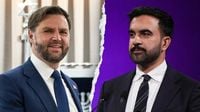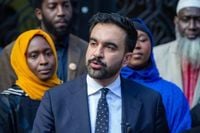New York City’s mayoral race has erupted into a fierce debate over Islamophobia, identity, and the memory of 9/11, with Democratic frontrunner Zohran Mamdani at the center of a controversy that’s drawn national attention—and sharp criticism from political heavyweights.
On October 24, 2025, Mamdani, the city’s first Muslim mayoral frontrunner, addressed supporters at a Bronx mosque, delivering a speech that quickly reverberated far beyond the city’s borders. In his remarks, Mamdani spoke candidly about his family’s experience in the aftermath of the September 11, 2001 terrorist attacks. He recalled his aunt’s decision to stop taking the subway because she no longer felt safe wearing her hijab, a symbol of her Muslim faith. “I want to speak to the memory of my aunt, who stopped taking the subway after September 11 because she did not feel safe in her hijab,” Mamdani said, according to Fox News. He added, “Growing up in the shadow of 9/11, I have known what it means to live with an undercurrent of suspicion in this city.”
Mamdani’s comments came as he sought to address what he described as persistent Islamophobia in New York City. “To be Muslim in New York is to expect indignity,” he declared, as reported by The Post Millennial. He went on to say, “The dream of every Muslim is simply to be treated the same as any other New Yorker, and yet, for too long, we have been told to ask for less than that and to be satisfied with whatever little we receive—no more.”
The candidate, who immigrated to the United States at age seven and became a citizen in his late twenties, described personal experiences of discrimination, including being called the wrong name and questioned by customs agents about his intentions for his adopted country. Mamdani’s speech was aimed, in part, at encouraging fellow Muslims not to hide their identities. “I will not change who I am, how I eat, or the faith that I’m proud to call my own,” he asserted, as quoted in The New York Post. “But there is one thing that I will change. I will no longer look for myself in the shadows. I will find myself in the light.”
But not everyone was moved by Mamdani’s words. The following day, Vice President JD Vance took to social media to mock the mayoral candidate, writing, “According to Zohran the real victim of 9/11 was his auntie who got some (allegedly) bad looks.” Vance’s comment, posted on X, sparked a firestorm among both supporters and detractors of Mamdani, with some accusing the Vice President of minimizing the discrimination faced by Muslim New Yorkers in the post-9/11 era.
Conservative commentator Scott Jennings weighed in on CNN, criticizing Mamdani for focusing on his own experience rather than the nearly 3,000 people who died in the September 11 attacks. “If you’re going to run for mayor of New York City or have any position in New York City, and you’re going to talk about 9/11 or invoke 9/11, you darn sure better start with the people who died in the Twin Towers,” Jennings argued. “That’s what I think, and he didn’t do that. He made it about his experience and his aunt and all this.”
The controversy didn’t stop there. Former Governor Andrew Cuomo, now running as an independent in the mayoral race, was accused by Mamdani of “Islamophobic rhetoric” after a radio appearance in which Cuomo questioned Mamdani’s ability to lead the city through a crisis. During a segment on WABC’s “Sid & Friends in the Morning,” Cuomo asked, “Any given moment, there’s a crisis, and people’s lives are at stake. God forbid, there’s another 9/11. Can you imagine Mamdani in the seat?” When host Sid Rosenberg replied, “He’d be cheering,” Cuomo responded, “That’s another problem,” before reiterating his doubts about Mamdani’s leadership in a crisis.
When asked by a reporter if Cuomo’s comments were Islamophobic, Mamdani replied, “Yes, I believe that they were. We’re speaking about a former governor who, in his final moments in public life, is engaging in rhetoric that is not only Islamophobic, not only racist, it’s also disgusting,” as quoted by Fox News.
The debate over Islamophobia is not occurring in a vacuum. New York City is home to nearly one million Muslims—about 9% of the population—boasting 275 mosques, 30 Islamic private schools, and hundreds of Halal eateries and grocery stores, according to The Post Millennial. Despite this vibrant presence, Mamdani contends that Muslims are still made to feel like “guests in our own home.” He cited three incidents of graffiti on mosques since 2021 and lamented that “Islamophobia is not seen as inexcusable. One can incite violence against our mosques and know that condemnation will never come.”
For comparison, Mamdani pointed out that in 2024 alone, there were 976 antisemitic incidents recorded in the city, highlighting the persistence of hate crimes and the challenges faced by religious minorities in New York.
Mamdani’s campaign has become a lightning rod for debates about identity, inclusion, and the boundaries of acceptable political rhetoric. He has accused his opponents of encouraging Muslims to “hide in the shadows,” a claim he says is contradicted by the city’s thriving Muslim community. “It is only in New York City’s shadows where Muslims could embrace their full identities,” Mamdani observed, referencing advice he received from family to downplay his Muslim identity for safety reasons.
As early voting began on October 25, 2025, Mamdani led the polls against independent candidate Andrew Cuomo and Republican nominee Curtis Sliwa. The campaign’s final stretch is being shaped by high-profile endorsements and pointed attacks. Mayor Eric Adams, who dropped out of the race, endorsed Cuomo, while House Minority Leader Hakeem Jeffries threw his support behind Mamdani.
The question of how to remember 9/11—and who gets to define its legacy—has become a central issue in the race. Mamdani’s critics accuse him of downplaying the tragedy’s primary victims, while his supporters argue that acknowledging the discrimination faced by Muslims in the aftermath is both necessary and overdue. The debate, at its core, is about what it means to be a New Yorker in a city still marked by the scars of 9/11, but also defined by its diversity and resilience.
With the general election just days away, the outcome remains uncertain. What is clear, however, is that the conversation sparked by Mamdani’s remarks has forced the city to grapple once again with the complex intersections of memory, identity, and belonging in the shadow of its most traumatic day.


